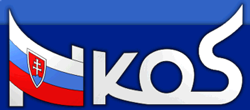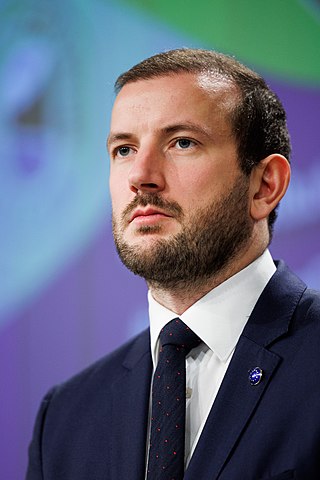
The Confederation of Swedish Enterprise or Swedish Enterprise is a major employers' organization for private sector and business sector companies in Sweden. It has 49 member associations representing 60,000 member companies with more than 1.6 million employees.

The Labour Party is a populist centre-left political party in Lithuania. The party was founded in 2003 by the Russian-born millionaire businessman and member of Seimas Viktor Uspaskich.

The Nasdaq Vilnius is a stock exchange established in 1993 and currently operated by Nasdaq, Inc.. Shares are listed on a Nasdaq Baltic stock exchange together with stocks from Latvia and Estonia.
Labour unions emerged in Japan in the second half of the Meiji period, after 1890, as the country underwent a period of rapid industrialization. Until 1945, however, the labour movement remained weak, impeded by a lack of legal rights, anti-union legislation, management-organized factory councils, and political divisions between “cooperative” and radical unionists.

The Confederation of Danish Industry (DI) is Denmark's largest business organization (chambers of commerce) and employers' organization. DI's members are 18,000 private enterprises in manufacturing and the service industry, from virtually all sub-sectors. Also, a number of sectoral employers' associations and branch federations are included in DI's framework, being integrated in part or in full in DI. Moreover, the members of DI in each county constitute a regional federation dealing with regional policy as well as educational issues. The organization represents its members in public discussions of new political ideas, and it comments on current events in Denmark. The DI director general and CEO is Lars Sandahl Sørensen.

Scouting and Guiding in Lithuania consist of a number of different organizations, some of them connected to international bodies. Besides open associations, there are also some for the national minorities living in Lithuania, as well as Girl Scouts of the USA.

The Independent Christian Trade Unions of Slovakia (NKOS) is a trade union center in Slovakia. It has a membership of 10,000 in three affiliated unions. Independent Christian Unions of Slovakia (NKOS) are an Open Union Confederation, based on Christian principles of democracy and humanism, registered at the Ministry of Interior of the Slovak republic on 26 May 1993 by law no. 83/1990 Zb. about Association of Citizens, as amended. History of NKOS In the years 1920 -1940 Christian unions were a significant factor in the state. They were called the Slovak Christian-social trade association. Their activity was forcibly closed in 1948. After the Velvet Revolution in 1989, an effort to restore their activity emerged. In 1990 the first Christian workers' clubs were created. Then came Christian Unions of Slovakia. Christian trade unionists efforts culminated on 26 March 1993 when NKOS were registered at the Ministry of Interior, their chairman was prof. Milan Katuninec. In 1994 the first NKOS trade union, railways, was created, with the chairman Joseph Micsinai and two years later the Trade Union of Workers in Education and Science of Slovakia came into existence with its first chairman Vladimir Cinderella. In 1995, a trade union KOVO METAL was founded, its first chairman was Dušan Mihalik. In December 1994, NKOS became a member of the International Labour Organisation. They became an observer of ITUC on the Compounding Congress in Vienna in 2006.

Jonas Vailokaitis was a Lithuanian banker and industrialist. He as his brother Juozas Vailokaitis (1880–1953) were widely regarded as the richest men in interwar Lithuania. He was one of the twenty signatories of the Act of Independence of Lithuania.
Miguel B. Varela was a Filipino businessman, corporate lawyer, and management practitioner. He was the president and chairman of the Philippine Chamber of Commerce and Industry (PCCI), the largest business organization in the Philippines. He was also the president of the Employers Confederation of the Philippines (ECOP), the largest association of employers in the country.

The Manufacturers’ Association of Israel (MAI) is the umbrella organization and representative body of all industrial sectors in Israel including the private, public, kibbutz, and government industries. With a membership of over 1,800 organizations responsible for more than 90% of the industrial output, the Manufacturers’ Association of Israel is the largest and most influential economic organization in the country. Dr. Ron Tomer has led the organization as President since January 30, 2020. Headquartered in Tel Aviv, the Manufacturers’ Association of Israel has three other regional branches. The Northern branch, located in the city of Haifa, serves over 600 different member organizations which are responsible for around one third of all the industrial manpower in Israel. The Jerusalem branch, located in the city of Jerusalem, serves over 130 different member organizations. The Southern branch, located near the city of Be’er Sheva, serves over 350 different member organizations.

The Ministry of Economy and Innovation of the Republic of Lithuania is a government department of the Republic of Lithuania. Its operations are authorized by the Constitution of the Republic of Lithuania, decrees issued by the president and prime minister, and laws passed by the Seimas (Parliament). Its mission is to develop positive legal and economic environment for economic development and ensure public welfare and employment.

Henryka Teodora Bochniarz is a Polish economist and administrator who is a former Minister of Industry and Trade in the Government of Poland.
Robertas Dargis was the President of Lithuanian Confederation of Industrialists (LPK) from 2012 to 2020. He is currently the President of Lithuanian Real Estate Development Association and Chairman of the Board and the owner of JSC Eika.
The Lithuanian Helsinki Group was a dissident organization active in the Lithuanian SSR, one of the republics of the Soviet Union, in 1975–83. Established to monitor the implementation of the Final Act of the Conference on Security and Cooperation in Europe, better known as Helsinki Accords, it was the first human rights organization in Lithuania. The group published over 30 documents that exposed religious repressions, limitations on freedom of movement, political abuse of psychiatry, discrimination of minorities, persecution of human right activists, and other violations of human rights in the Soviet Union. Most of the documents reached the West and were published by other human rights groups. Members of the group were persecuted by the Soviet authorities. Its activities diminished after it lost members due to deaths, emigration, or imprisonment, though it was never formally disbanded. Some of the group's functions were taken over by the Catholic Committee for the Defense of the Rights of Believers, founded by five priests in 1978. Upon his release from prison, Viktoras Petkus reestablished the Lithuanian Helsinki Group in 1988.

Nuklonas is a former military manufacturer of integrated circuits in Šiauliai, Lithuanian Soviet Socialist Republic.

Virginijus Sinkevičius is a Lithuanian politician who was serving as European Commissioner for the Environment, Oceans and Fisheries in the European Commission led by Ursula von der Leyen from 2019 to 2024. In the 2024 European elections he was elected and became a member of the European Parliament. He previously was a Member of the Seimas of the Republic of Lithuania and Minister of the Economy and Innovation of the Republic of Lithuania.
Confederation of Industry of the Czech Republic is an employer's union in the Czech Republic. It is a non-state organization, independent of government, political parties and trade unions, influencing the economic and social policy of the government and working to create optimal conditions for business. It defends the interests of employers at the level of the Czech Republic, but also in European and global organizations. It negotiates on behalf of employers with the government and trade unions in the Council of Economic and Social Agreements, the so-called tripartite.
The Lithuanian Party of the Economy was a minor political party in Lithuania founded in 1995, largely at the initiative of the Lithuanian business community. After winning no seats in the 1996 Lithuanian parliamentary election and only five seats in the 1997 municipal elections, it ceased activity. The party disbanded in 2011.

LINPRA, established in 1993, is a Lithuanian trade organization for engineering companies, headquartered in Vilnius, Lithuania. It the largest engineering trade organization in The Baltic States, representing 150 companies.













